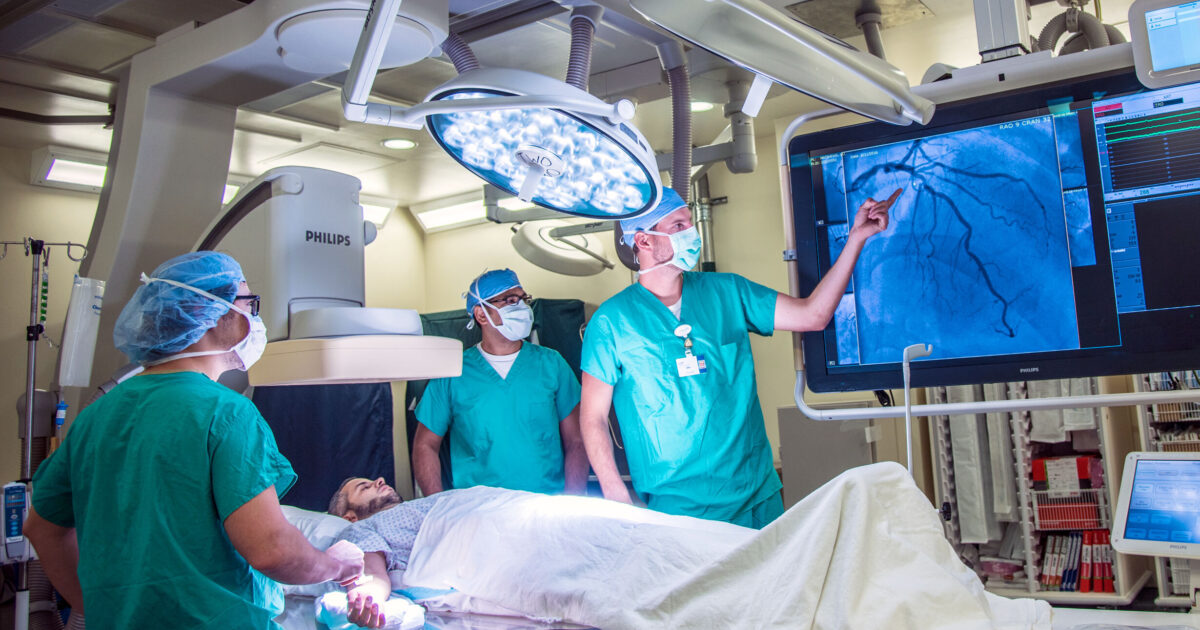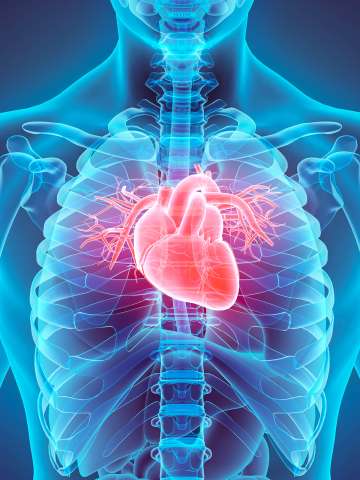What does a Cardiologist do? Cardiology demystified
What does a Cardiologist do? Cardiology demystified
Blog Article
Understanding the Significance of Cardiology in Modern Health Care Solutions
Cardiology plays an essential duty in modern healthcare, particularly as cardiovascular disease continues to be the leading source of death worldwide. Developments in diagnostics and treatment have changed person treatment, allowing earlier interventions and improved end results. Moreover, the shift towards preventative cardiology equips individuals to manage their wellness proactively. As innovation continues to advance, the combination of innovative solutions may further redefine cardiology's influence on public health and wellness, prompting a more detailed evaluation of arising patterns and their implications.
The Frequency of Heart Problem and Its Influence On Public Wellness
Heart condition stays the leading reason of death globally, its impact prolongs much beyond specific clients to affect public wellness systems and economic climates. The high prevalence of heart problem places a significant stress on medical care resources, demanding enhanced financing for rehabilitation, avoidance, and therapy programs. Public health and wellness campaigns should resolve risk aspects such as weight problems, cigarette smoking, and less active lifestyles, which contribute significantly to the increasing occurrence of heart conditions.Moreover, the financial worry associated with cardiovascular disease is enormous, including not just straight medical costs but likewise indirect expenditures associated with shed productivity and early mortality. Neighborhoods deal with challenges in taking care of these costs, often bring about disparities in healthcare access and outcomes. As the population ages and lifestyle-related dangers remain to intensify, the urgency for efficient cardiology treatments comes to be paramount. Attending to heart disease is not just a matter of private health however also a vital public health top priority.
Advances in Heart Diagnostics and Imaging Techniques
Recent developments in cardiac diagnostics and imaging methods have revolutionized the area of cardiology, enhancing the capacity to discover and keep track of heart problem. Strategies such as heart MRI, CT angiography, and echocardiography have actually ended up being progressively advanced, supplying detailed photos of cardiac structures and features. These techniques enable the early identification of conditions like coronary artery condition, cardiac arrest, and valvular disorders.Moreover, innovations in non-invasive diagnostics, such as wearable innovation and remote monitoring devices, have encouraged people and doctor. These devices assist in real-time monitoring of heart rhythms and other important indicators, bring about prompt interventions. Furthermore, man-made knowledge is being integrated into imaging analysis, boosting accuracy and performance in medical diagnosis.
Innovations in Treatment Choices for Heart Issues
Recent advancements in cardiology have actually resulted in significant developments in therapy alternatives for heart conditions. These include advanced medical techniques that enhance step-by-step results and arising medications that provide new opportunities for treatment. As the field advances, these innovations play an important duty in boosting person care and results.
Advanced Surgical Techniques
Developments in surgical methods have actually transformed the landscape of cardiology, using brand-new expect clients with heart disease. Minimally invasive procedures, such as catheter-based treatments, have considerably reduced recuperation times and hospital stays. Methods like robotic-assisted surgical treatment enhance accuracy, permitting doctors to browse complicated anatomical frameworks with better precision. Developments in imaging innovation facilitate real-time visualization during procedures, improving outcomes. Transcatheter aortic shutoff substitute (TAVR) exhibits a breakthrough in dealing with aortic constriction, enabling valve replacement without open-heart surgical procedure. In addition, hybrid methods that combine surgical and catheter-based methods supply tailored services for numerous heart concerns. These innovative surgical strategies not only improve client safety and security yet additionally expand therapy options, highlighting the critical role of technology in contemporary cardiology methods.
Arising Treatments and medicines
As the landscape of cardiology remains to progress, emerging therapies and drugs play a pivotal function in improving treatment options for heart problems. Innovations such as unique anticoagulants and advanced lipid-lowering representatives have changed the administration of cardiovascular conditions, considerably decreasing individual morbidity and mortality. In addition, the development of gene treatments and regenerative medication provides appealing opportunities for dealing with problems formerly deemed incurable. Professional tests are continually revealing the effectiveness of these therapies, pressing the limits of typical treatments. In addition, the assimilation of electronic wellness modern technologies promotes personalized medicine, permitting customized treatment plans based upon hereditary and way of living aspects. Jointly, these improvements highlight the vibrant nature of cardiology, improving patient outcomes and redefining criteria of treatment in modern health care.
The Role of Preventive Cardiology in Person Care
Preventive cardiology plays an important role in person treatment by concentrating on the recognition of risk elements that add to cardiovascular disease. Through lifestyle adjustment methods and very early detection methods, doctor can properly decrease the occurrence of cardio occasions - Cardiology. This aggressive method not just enhances patient end results yet also advertises lasting health
Risk Element Recognition
While cardiovascular diseases remain a leading reason of morbidity and mortality worldwide, reliable threat aspect recognition offers as a cornerstone of preventive cardiology. Identifying risk elements such as high blood pressure, household, hyperlipidemia, and diabetic issues background is necessary for early intervention. Health care specialists utilize various screening methods to assess these elements, enabling customized preventive steps. Furthermore, understanding a person's way of living selections, such as smoking and physical inactivity, additionally notifies danger analyses. This comprehensive evaluation enables clinicians to develop personalized treatment strategies intended at mitigating risks. By focusing on danger aspect recognition, medical care systems can boost individual end results and decrease the total problem of heart diseases, eventually adding to enhanced public health approaches and source allowance.
Way Of Life Adjustment Techniques
A wide variety of studies highlights the crucial duty of lifestyle modification approaches in reducing heart disease danger. These techniques include nutritional modifications, enhanced exercise, smoking cigarettes cessation, and weight monitoring. By adopting a heart-healthy diet plan rich in fruits, vegetables, whole grains, and lean healthy proteins, individuals can lower cholesterol degrees and blood pressure. Regular exercise enhances the heart and improves general cardiovascular wellness. Furthermore, quitting smoking considerably minimizes the danger of cardiovascular disease and improves healing prices for those with status quo. Weight management better contributes to cardio health by alleviating various other risk elements such as diabetes and hypertension. Carrying out these way of living alters not just advertises specific health yet additionally offers as a foundation of precautionary cardiology in individual care.
Early Detection Strategies
Way of life modifications greatly add to decreasing heart disease dangers, but they are most effective when combined with early discovery methods. Preventive cardiology stresses the importance of identifying possible heart issues prior to they intensify into severe conditions. Strategies such as blood pressure surveillance, cholesterol screening, and progressed imaging innovations like echocardiograms play essential duties in assessing cardio health. Biomarkers and hereditary testing likewise boost the precision of very early detection, enabling for customized precautionary approaches. Regular heart risk assessments encourage healthcare providers to step in proactively, possibly preventing heart assaults and strokes (Cardiology care). By incorporating these early detection techniques right into routine care, individuals can profit from timely way of life treatments and targeted therapies, ultimately improving results and boosting high quality of life
Integrating Modern Technology Into Cardiology Practices
As innovations in technology remain to improve various areas, the assimilation of innovative tools and systems into cardiology methods has actually come to be essential for enhancing client care and results. Telemedicine systems allow cardiologists to keep an eye on people from another location, boosting accessibility to care while decreasing the worry on medical care centers. Wearable devices, such as smartwatches, allow constant heart price tracking, notifying both physicians and clients to prospective issues in real-time. Furthermore, expert system (AI) is being utilized to examine large quantities of cardiac information, helping in very early medical diagnosis and customized treatment plans. Advanced imaging methods, including 3D echocardiography, boost visualization of heart frameworks, bring about extra precise treatments. Digital health and wellness records (EHRs) improve person information monitoring, making certain that cardiologists have prompt access to vital information. Together, these technological advancements are changing cardiology, promoting proactive monitoring and enhanced health end results for patients with cardiovascular problems.
The Relevance of Client Education And Learning and Interaction
Client education and involvement play a my response critical duty in the administration of cardio health. By outfitting clients with expertise about their problems, therapy options, and way of life changes, doctor equip individuals to take an energetic role in their treatment. This aggressive strategy see here can result in boosted adherence to prescribed drugs, dietary modifications, and exercise programs, ultimately minimizing the threat of complications.Engagement also promotes a solid patient-provider partnership, encouraging open communication and depend on. When people feel educated and involved, they are more probable to voice problems and ask questions, which can result in far better medical results. Furthermore, instructional sources, such as workshops or digital platforms, can enhance understanding and promote self-management techniques. Generally, focusing on individual education and learning and engagement is vital for improving cardio wellness, boosting lifestyle, and lowering medical care prices linked with heart diseases.
Future Patterns in Cardiology and Their Prospective Effect

Regularly Asked Inquiries
What Lifestyle Changes Can Minimize Cardiovascular Disease Risk?
The current concern addresses way of life modifications that can substantially lower heart disease risk. Cardiology care. Embracing a well balanced diet regimen, taking part in normal physical task, keeping a healthy and balanced weight, handling anxiety, and staying clear of cigarette can significantly improve cardiovascular health
Exactly How Can I Recognize Early Signs of Heart Problems?
Recognizing very early indicators of heart troubles entails tracking signs such as breast pain, shortness of breath, fatigue, and uneven heart beat. Prompt understanding of these indications can motivate needed medical assessment and intervention for much better outcomes.
What Are the Distinctions Between Cardiologists and Heart Surgeons?
The differences in between cardiologists and heart specialists exist in their roles; cardiologists primarily detect and take care of heart conditions via non-invasive approaches, while heart try here surgeons perform surgical treatments to correct structural heart concerns. Each plays an important, distinctive role.

Exactly how Frequently Should I Get My Heart Health Checked?
The frequency of heart medical examination differs based upon private risk factors. Generally, grownups ought to undergo evaluations each to two years, while those with current problems might require more regular assessments as advised by healthcare specialists.
What Duty Does Genes Play in Heart Condition Danger?
Genetics significantly influences heart problem danger, with domestic patterns showing acquired conditions. Particular genes can incline people to high blood pressure, cholesterol concerns, and various other cardiovascular problems, highlighting the significance of genetic screening in examining heart wellness. Heart disease remains the leading cause of death worldwide, its effect prolongs far beyond private clients to impact public health and wellness systems and economic climates. Public health and wellness campaigns have to resolve threat variables such as excessive weight, smoking, and sedentary way of livings, which contribute substantially to the increasing incidence of heart conditions.Moreover, the financial burden linked with heart illness is tremendous, incorporating not only direct medical prices yet additionally indirect costs associated to lost performance and early death. Precautionary cardiology plays a vital function in patient treatment by concentrating on the identification of risk variables that add to heart illness. Synthetic intelligence (AI) and equipment discovering are improving diagnostics and client monitoring, making it possible for early detection of heart conditions. The differences between cardiologists and heart cosmetic surgeons lie in their duties; cardiologists mainly take care of and detect heart problems through non-invasive approaches, while cardiac surgeons do surgical treatments to fix architectural heart problems.
Report this page